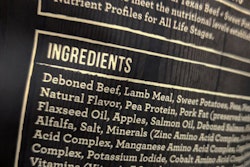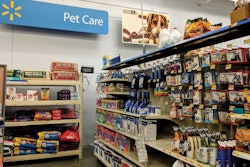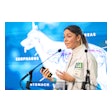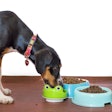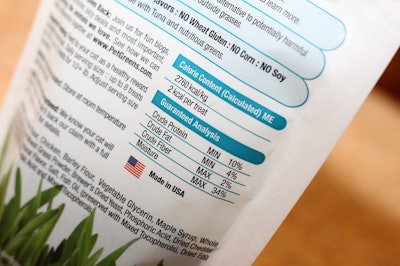
Mars Petcare introduced their clean label Nutro line of superpremium pet food in the United Kingdom, reported Global Pets.
The first Nutro product launched in the U.K. is the grain-free, non-GMO Nutro Wild Frontier brand. That range of products touts that 70 percent of its ingredients are from animal sources. Eighteen SKUs of Wild Frontier pet foods became available for retailers to order on September 10 in the U.K. Consumers will be able to get a refund on their first bag of certain packs of Nutro by uploading their receipt to the Nutro website.
Nutro’s marketing appeals to the clean label trend, which moved into pet food from human food, by promoting its “Feed Clean” philosophy. In general, clean label products use no artificial ingredients and no genetically modified organisms (GMOs), but do use a short list of easily identified ingredients.
Survey finds dog owners want clean label dog food
In an online survey of 1,500 US dog owners by Nutro pet food, 90 percent of dog owners said that they try to eat food meeting the criteria of the human clean food trend, at least some of the time. Seventy-five percent of respondents said their clean eating efforts influence what they feed their dogs.
Of the dog owners surveyed:
- 83 percent make an effort to read their dog’s food label, and half do this always or often.
- Given the option, two thirds (65 percent) would opt for non-GMO ingredients for their dog’s food.
- 92 percent say it’s important that their family’s food has ingredients that are whole, simple and not artificial.
A clean label generally refers to short ingredients lists with recognizable names, along with “free from” or “no” claims. On the Nutro survey:
"The term 'clean food' was defined as incorporating whole fruits and vegetables, recognizable ingredients, products with a short/simple ingredient list into your diet and avoiding artificial flavors, colors or preservatives," a Nutro representative told Petfood Industry.
"Dog owners aged 18 and over participated in the survey via an email invitation,: she said. "These respondents were selected and invited to participate at random from a double-opted in and fully managed online research panel and sourced from online communities and applications through a variety of publishers."
Nutro adapting to clean label trend
In line with this trend in human and pet food, Nutro pet food brand launched a new corporate philosophy that focuses on the concept of clean food: Nutro. Feed Clean.
According to the company the Nutro Feed Clean philosophy adapts the human clean eating trend to pets with pet food recipes that are simple, purposeful and made with recognizable, non-GMO ingredients.
“The Nutro brand is taking the clean eating trend in human food and translating that to pet food, creating recipes that satisfy the nutritional needs of dogs,” said Chris Mondzelewski, general manager of pet specialty, Mars Petcare North America, in a press release. “That’s the sweet spot we’re going for, and I believe Nutro dry dog food gets it exactly right.”
Nutro Feed Clean has an advisory board to help guide future pet food product development. The board includes Terry Walters, an author of two cookbooks on the clean eating lifestyle movement.
Clean label in pet food—is achieving it possible?
Transparency is a critical component in the business of feeding humans and animals, and the clean label movement is one tool the industry is embracing to satisfy the customer’s need for information, wrote Mellissa Brookshire, DVM, in her Petfood Industry blog.
A study from the NPD Group surveyed 5,000 consumers and found that 80 percent of “clean eaters” considered this a lifestyle, not a trend. The most important features of a clean diet for those surveyed were foods that do not contain chemicals, preservatives, additives or pesticides.
Without a clear definition or any regulatory guidelines, the door for class-action litigation is open, so proceeding with caution is advisable, wrote Brookshire.




